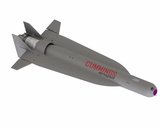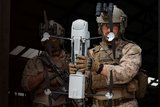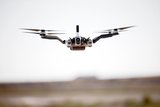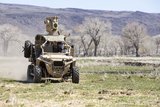First group of UPT pilots graduate from Predator training
The first group of Undergraduate Pilot Training students completed the MQ-1 Predator Formal Training Unit's Initial Qualification Training Course here April 24.
Along with the UPT students, the class graduated 20 students, which translates to 10 crews.
A crew comprises a pilot and sensor operator. The training consisted of 84 academic hours, 16 simulator and eight flight hours. The FTU 09-05 class was also the first class that was trained using the new Air Combat Command MQ-1 Initial Qualification Training Course syllabus.
"The biggest strength of the UPT direct students was their ability and willingness to learn," said Maj. Richard Kattau, an 11th Reconnaissance Squadron instructor pilot and flight commander for FTU 09-05. "This course is fast-paced and the expectation is that aircrew who graduate from the course are ready to fly operationally at the unit they are sent to with only some top-off training covering (area of responsibility) and squadron specific differences,"
Blocks of instruction included basic aircraft handling where the students learned how to fly the aircraft including systems and autopilot modes, an intelligence, surveillance and reconnaissance block, where they learned the basics of finding and exploiting an intelligence target, Major Kattau said.
Instruction also included a basic surface attack block, where the students learned the fundamentals of employing the AGM-114 Hellfire missile from the Predator, a close-air support block focusing on the employment of the Predator and integration with other airborne strike platforms in direct support of ground forces as well as combined operations block, which requires application of all the other blocks of training integrated into scenarios.
There were some challenging aspects of the course such as cross-checking because it involved more coordination with the people around you instead of the aircraft itself, said 1st Lt. Bret Saubert, who was one of the UPT students to recently graduate from the Predator FTU. Being in a training environment with rated pilots from other weapons systems was beneficial during some of the training blocks.
Major Kattau said the UPT students have received the 11th RS seal of approval and have moved onto their operational squadrons and have begun their indoctrination training to become certified as combat mission ready.
"If we did not ultimately think the students were ready, we would not have graduated them from the course," he said. "They are ready for combat."
Lieutenant Saubert, said he was a little hesitant at the news he would be flying unmanned aircraft rather than manned aircraft like most of his UPT counterparts, but over time, he said he realized the value behind the UAS mission.
"After meeting the rest of the UPT pilots scheduled to go to Creech Air Force Base, we began to look at this job more for its operational benefits to the war on terrorism and how we would be a direct part of that fight," Lieutenant Saubert said.
Air Force officials announced last year that they would increase the number of UAS pilots through two new training initiatives. The first initiative, already in progress, will draw 100 Undergraduate Pilot Training graduates per year and bring them straight into UAS training. The FTU 09-05 class had three students who came to Creech AFB directly from UPT.
by Staff Sgt. Alice Moore - 432nd Wing Public Affairs
More from Uncrewed Vehicles
-
![Cummings Aerospace showcases Hellhound loitering munition designed for US Army’s LASSO programme (video)]()
Cummings Aerospace showcases Hellhound loitering munition designed for US Army’s LASSO programme (video)
Cummings Aerospace presented its turbojet-powered Hellhound loitering munition at SOF Week 2025, offering a man-portable solution aligned with the US Army’s LASSO requirements.
-
![SOF Week 2025: PDW unveils attritable FPV drone for SOF operations at scale]()
SOF Week 2025: PDW unveils attritable FPV drone for SOF operations at scale
PDW has revealed its Attritable Multirotor First Person View drone at SOF Week 2025, offering special operations forces a low-cost, rapidly deployable platform for strike and ISR missions, inspired by battlefield lessons from Ukraine.
-
![SOF Week 2025: Teledyne FLIR white paper provides guidance on reusable loitering munitions]()
SOF Week 2025: Teledyne FLIR white paper provides guidance on reusable loitering munitions
Teledyne FLIR is highlighting the emerging requirements for 'recoverable and re-usable' loitering munitions across the contemporary operating environment during this week’s SOF Week conference in Tampa, Florida.
-
![SOF Week 2025: Kraken Technology group debuts K3 Scout USV in North America]()
SOF Week 2025: Kraken Technology group debuts K3 Scout USV in North America
High-performance maritime industry player Kraken Technology Group, based in the UK, has used the SOF Week conference in Tampa, Florida this week to debut its K3 Scout uncrewed surface vessel (USV) to the North American market.
-
![Palladyne AI and Red Cat to demonstrate capabilities for autonomous drone swarms to the US military]()
Palladyne AI and Red Cat to demonstrate capabilities for autonomous drone swarms to the US military
Red Cat and Palladyne AI recently conducted a cross-platform collaborative flight involving three diverse heterogeneous drones.
-
Jammer resistant drone designs spark search for countermeasures
The Russia-Ukraine conflict has driven another stage of evolution for drones and the counter measures to defend against them.

























